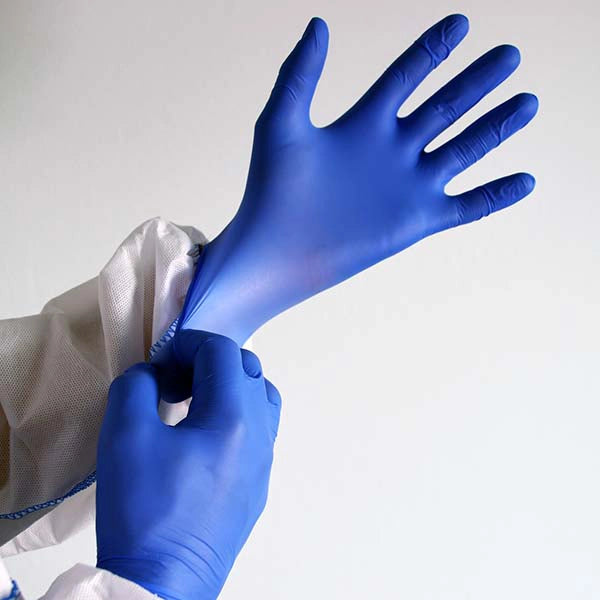Are disposable vinyl gloves safe for people who are allergic to latex? Are vinyl gloves latex free? The answer is yes, but there are other important concerns you need to be aware of.
In this vinyl gloves guide, we will answer these two questions and provide more details about other matters to consider before making your next purchase.
With the rise of latex allergies, it is important to find the right type of hand protection to keep you and others around you safe. It is so critical to your health that a law was passed by the Federal Food and Drug Administration requiring all medical devices to include a statement on the label that says, “Caution: This Product Contains Natural Rubber Latex Which May Cause Allergic Reactions.”
A serious reaction to latex can be prevented if you choose the right type of gloves to use. This is one of many reasons why vinyl is a popular choice among the full array of disposable glove options.
Advantages
Disposable vinyl exam gloves are a good alternative for people with latex allergies. In some cases, they are a superior option. Vinyl gloves are ideal because they are latex-free and usually the cheapest.
They offer a variety of protective features when handling non-hazardous materials. This makes them an excellent option in the food and beverage industry. They are also a common choice in many household and commercial applications that require routine donning and removal. This includes professions such as hairstyling, house cleaning, assisted living work, washing, maintenance, and food preparation.
Besides being highly affordable, they are great for low-risk tasks for a short period of time. They are suitable for use as a protective barrier against detergents, dyes, and low-risk bodily fluids.
Vinyl Glove Allergies
An allergic reaction to vinyl gloves is almost non-existent. Instances of an allergy to vinyl gloves are very uncommon. Those who do complain about some type of reaction are really experiencing a skin irritation, called contact urticaria, caused by a lack of ventilation inside the glove.
What is Contact Urticaria?
Contact Urticaria is a simple skin irritation that is very mild and temporary. Using fabric liners that absorb sweat can help prevent the problem. They can either be built into the glove or worn as a separate layer underneath. This thickens the overall hand defense, reducing mobility and finger dexterity.
Are Vinyl Gloves Waterproof?
Vinyl gloves are waterproof. Any type of sealed glove will make your hands sweat after being worn for a length of time. The moisture from perspiration and heat gets trapped inside the glove. This causes the skin to become irritated making it uncomfortable.
Benefits of Disposable Vinyl Gloves
- Protein-free and latex-free
- Inexpensive
- Good for short-term, low-risk tasks around low-level chemicals
- Have anti-static properties
What are the Materials Used to Make Vinyl Gloves?
Vinyl gloves are made from a synthetic rubber latex that is petroleum-based. Polyvinyl chloride (PVC) and plasticizers are the synthetic latex material used in the production of vinyl disposable gloves. It lacks naturally occurring proteins present in natural rubber latex.
What is important to remember is that not all allergic reactions to wearing gloves are caused by latex. Other chemical additives in gloves may cause allergic reactions or irritant contact dermatitis in the person wearing them.
Are Vinyl Gloves Safe?
Overall, they are safe to use in the workplace where latex allergies may be present. They do not run the risk of allergic reactions associated with natural rubber latex (NRL) gloves. Furthermore, vinyl gloves have a longer shelf life because they are synthetic and non-biodegradable.
Disadvantages
Even though vinyl gloves are typically the cheapest option saving you money, great for simple tasks not involving strong chemicals, and latex-free, there are a few other important things to consider.
One big disadvantage of vinyl gloves is minor protection. They are not meant to be worn for long periods of time and offer little in chemical resistance. In general, the fit is loose and less flexible than their latex and nitrile counterparts. This may make them feel uncomfortable since the fit is not as snug, especially if your hands have been sweating.
Hazardous substances should not be handled with this type of glove because of the low resistance to chemicals and high propensity to leakage. Reports indicate that after about an hour of wearing the gloves, they will begin to leak. The substances you are handling may leak through the vinyl glove barrier.
More Cons
- Less durable
- Limited chemical protection
- Less resistant to biomedical exposure and micro-organisms
- Can tear easily
- Looser fit
- Non-biodegradable
What are Vinyl Gloves Used For?
Vinyl gloves are used fr similar tasks as latex or nitrile gloves. They are widely used in all food service sectors, research facilities, clinics, and everyday household tasks.
Even More Places that Use Vinyl Gloves:
- Food processing and meal preparation
- Dentistry, medical, cosmetics, and beauty
- Janitorial and housekeeping services
- Automotive and manufacturing
They can be found anywhere there is a need for cleanliness and where there is a low risk of contact with bodily fluids that could cause infection.
Standard Vinyl Gloves are Typically Used For:
- Cleaning tasks in food preparation areas
- Low-risk personal care process tasks for hands and fingers
- Light-duty janitorial, housekeeping and maintenance work
- Machinery assembly and low maintenance work
Are They Right For You?
They are ideally suited for restaurant work and other uses that necessitate some protection but do not necessarily require a high level of dexterity or tactile accuracy.
When to Use Vinyl Gloves
They should be used whenever your hands may be exposed to less toxic liquids, disinfectants, detergents, dust, mild cleansers or other light chemicals. They are also safe to use around food.
Conduct a risk management assessment to calculate the level of risk and the appropriate level of protection.
The Glove Selection Process
Select and fit gloves for the task to be performed. If your hands are extremely sweaty, consider using a liner glove or practice double-gloving with an antimicrobial glove underneath. Wearing a glove or liner underneath in a different color will also help you notice punctures and tears quicker.
Are Vinyl Gloves Latex Free?
Yes, but keep all other concerns discussed in this vinyl gloves guide in mind as well. In conclusion, vinyl gloves are great for the public or anyone who only needs some protection but not a lot of dexterity. In general, they don't provide enough chemical resistance, but they are a good choice to use while trying to keep your hands clean.
Powder Free Vinyl Gloves
By the way, did you know that we carry powder free vinyl exam gloves? We also carry the bestselling powder free black vinyl gloves and powder free blue vinyl gloves in all sizes. Take advantage of our one-stop shop to get everything you need.
If you are unsure whether vinyl is the right type of glove material for you, read the vinyl vs nitrile gloves guide and vinyl vs latex gloves guide.




